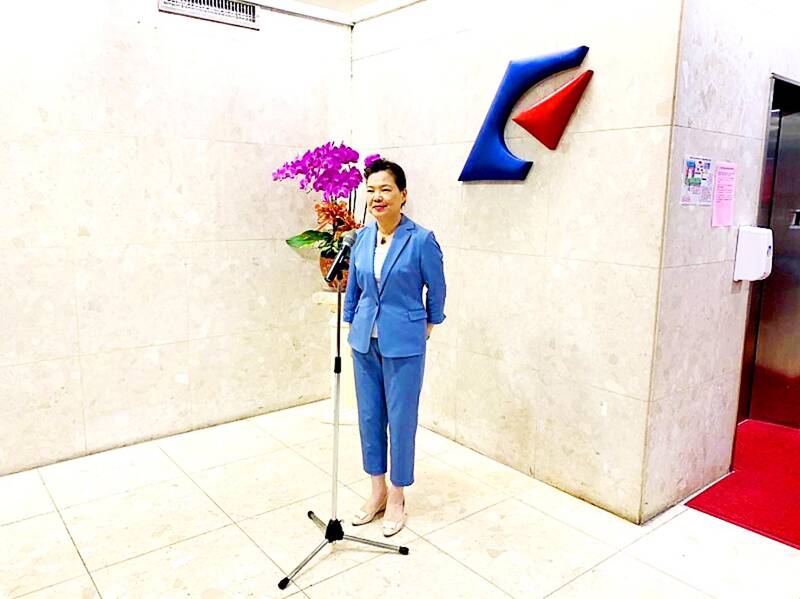Taiwan plans to maintain its energy policy of operating nuclear power reactors until the end of their desinged lifespan, and by using other energy sources to fill gaps in the energy supply, the Ministry of Economic Affairs said yesterday.
“Taiwan will stick to its nuclear power plant timeline. Despite differing opinions, we do not plan to shut down those reactors before of the end of their designed life cycles,” Minister of Economic Affairs Wang Mei-hua (王美花) told reporters in Taipei.
The state-run Taiwan Power Co (Taipower, 台電) has drafted several measures to secure a stable power supply, including electricity allocation plans to manage water shortages caused by climate change and surging energy costs resulting from the war in Ukraine, Wang said.

Photo: Ching Lin, Taipei Times
Japanese Prime Minister Fumio Kishida on Wednesday said that its government is considering using nuclear reactors beyond their designed lifespans along with restarting idled nuclear power reactors to manage a power crisis.
“My understanding is that Japan plans to make some arrangements about the idled reactors that were shut down following the Fukushima disaster in March 2011,” Wang said.
The government has decided to shift from nuclear power and move toward green power to cut carbon emissions.
The No. 2 reactor at Guosheng Nuclear Power Plant is set to stop operation in March next year, while the No. 1 and No. 2 reactors of the Ma-anshan Nuclear Power Plant are to close in 2024 and 2025 respectively, when they are due to reach the end of their operational lives of about 40 years.
Regulations stiputate that any adjustment to nuclear power operations be applied five years in advance, Taipower spokesman Wu Chin-chung (吳進忠) told the Taipei Times.
“The timing has passed,” he said.

TAKING STOCK: A Taiwanese cookware firm in Vietnam urged customers to assess inventory or place orders early so shipments can reach the US while tariffs are paused Taiwanese businesses in Vietnam are exploring alternatives after the White House imposed a 46 percent import duty on Vietnamese goods, following US President Donald Trump’s announcement of “reciprocal” tariffs on the US’ trading partners. Lo Shih-liang (羅世良), chairman of Brico Industry Co (裕茂工業), a Taiwanese company that manufactures cast iron cookware and stove components in Vietnam, said that more than 40 percent of his business was tied to the US market, describing the constant US policy shifts as an emotional roller coaster. “I work during the day and stay up all night watching the news. I’ve been following US news until 3am

UNCERTAINTY: Innolux activated a stringent supply chain management mechanism, as it did during the COVID-19 pandemic, to ensure optimal inventory levels for customers Flat-panel display makers AUO Corp (友達) and Innolux Corp (群創) yesterday said that about 12 to 20 percent of their display business is at risk of potential US tariffs and that they would relocate production or shipment destinations to mitigate the levies’ effects. US tariffs would have a direct impact of US$200 million on AUO’s revenue, company chairman Paul Peng (彭雙浪) told reporters on the sidelines of the Touch Taiwan trade show in Taipei yesterday. That would make up about 12 percent of the company’s overall revenue. To cope with the tariff uncertainty, AUO plans to allocate its production to manufacturing facilities in

Six years ago, LVMH’s billionaire CEO Bernard Arnault and US President Donald Trump cut the blue ribbon on a factory in rural Texas that would make designer handbags for Louis Vuitton, one of the world’s best-known luxury brands. However, since the high-profile opening, the factory has faced a host of problems limiting production, 11 former Louis Vuitton employees said. The site has consistently ranked among the worst-performing for Louis Vuitton globally, “significantly” underperforming other facilities, said three former Louis Vuitton workers and a senior industry source, who cited internal rankings shared with staff. The plant’s problems — which have not

COLLABORATION: Given Taiwan’s key position in global supply chains, the US firm is discussing strategies with local partners and clients to deal with global uncertainties Advanced Micro Devices Inc (AMD) yesterday said it is meeting with local ecosystem partners, including Taiwan Semiconductor Manufacturing Co (TSMC, 台積電), to discuss strategies, including long-term manufacturing, to navigate uncertainties such as US tariffs, as Taiwan occupies an important position in global supply chains. AMD chief executive officer Lisa Su (蘇姿丰) told reporters that Taiwan is an important part of the chip designer’s ecosystem and she is discussing with partners and customers in Taiwan to forge strong collaborations on different areas during this critical period. AMD has just become the first artificial-intelligence (AI) server chip customer of TSMC to utilize its advanced